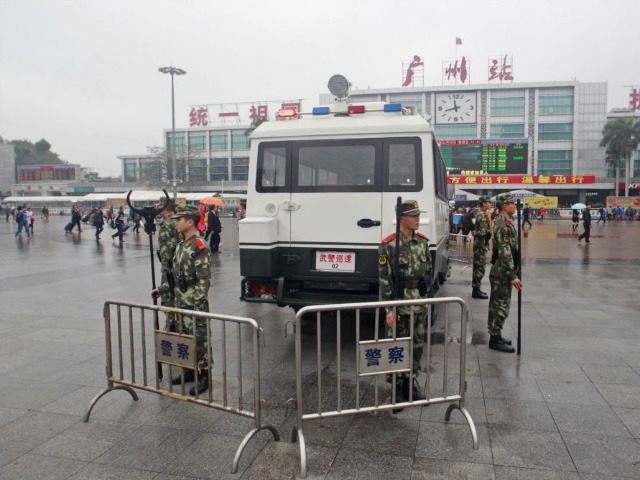A combined bomb and knife attack at a security checkpoint in western Xinjiang province has left at least 18 Chinese nationals dead, according to a Radio Free Asia report. The attack in the heavily Muslim-populated region, about which the Chinese government has offered sparse details, may be in retaliation for extreme religious restrictions during the holy month of Ramadan.
The Radio Free Asia report is based on interviews with a number of local officers, who claimed that most of the deaths were those of the attackers. The incident began, said officer Turghun Memet, when a car backed up onto a police officer and broke his leg after speeding through a security checkpoint. “Two other suspects then rushed out of the car, using knives to attack and kill two police officers who had come to rescue their comrade,” Memet added. The attack continued for some time, with associates of the initial attackers detonating explosives, as traffic police are not armed, and concluded with 15 terrorists dead, Memet concluded.
The attack occurred on the far-west border of China in Kashgar city. Another officer told Radio Free Asia that the attack had a “massive effect” on law enforcement, and that many police remain “panicked” at the possibility of a similar situation occurring before the end of Ramadan, which began last week.
The culprits are believed to be militants angered by Chinese government restrictions on the minority Uyghur population in China’s west, who are ethnic Turkic people and have long struggled against the rule of China’s majority Han population.
BBC and Reuters have confirmed the report, though Chinese authorities are mum on the details. Medical care staff in Kashgar confirmed that police officers had been treated in the local hospital. The Chinese Foreign Ministry provided Reuters with a statement, though little information. Without confirming that the attack occurred, spokesman Lu Kang told Reuters that “if it is correct, then the Chinese government has the responsibility to take resolute steps to stop these kinds of violent terror acts, to maintain peace and stability in Xinjiang.” Reuters estimates the death toll to be between 18 and 28, adding innocent bystanders hit by stray bullets and injured by explosives.
Chinese state media have not reported on the incident. The only article related to Xinjiang on the front page of state newspaper People’s Daily regards the expansion of the textile industry in the region.
The month of Ramadan requires Muslims to fast from sunrise to sunset, a practice that the Chinese government has banned in the name of atheistic communism. As Radio Free Asia notes, restaurants are forced to serve food all day even in high-Muslim Uyghur areas where clients are expected to be few and far between during Ramadan, and children are often forced to attend free lunches intended to teach them to break the fast.
While religion is banned generally in China, how Beijing imposes the Marxist ban depends highly on what kind of religion is expected to disturb that law in the country’s various regions. In Zhejiang, on the Pacific coast, Chinese authorities have banned the display of Christian crosses atop churches, forcing the religion underground. In Xinjiang, Christianity does not pose a threat, but regional laws have diligently banned a wide array of Muslim practices. Chinese Communist Party officials are banned from fasting during Ramadan, and any overt observance of Ramadan was banned last year.
In August 2014, the Chinese regional government banned wearing large beards, hijabs, burqas, or any “Islamic clothing” on public buses. In May, Xinjiang began forcing local shops to sell alcohol and cigarettes, both haram in the Muslim religion, going as far as to require shops to sell at least five different types of alcohol. The crackdowns on Islam are widely considered necessary steps to keep the region safe from Islamic radicalism, and were exacerbated by a particularly violent terrorist attack that injured 79 at a Xinjiang train station.

COMMENTS
Please let us know if you're having issues with commenting.